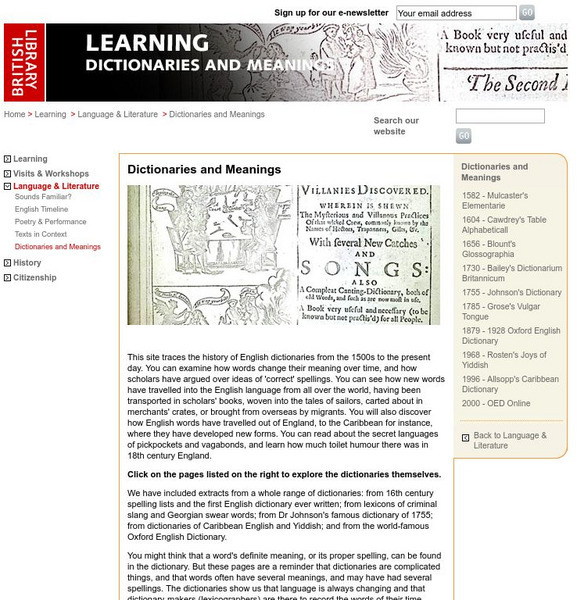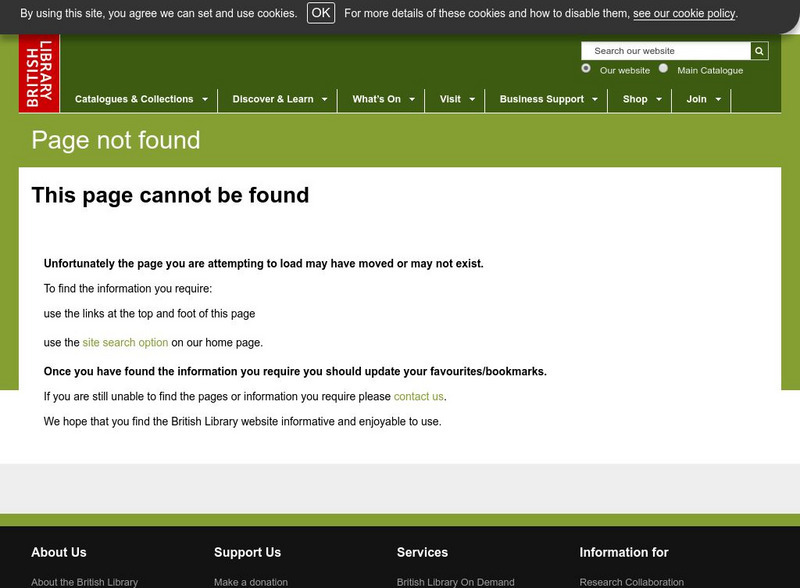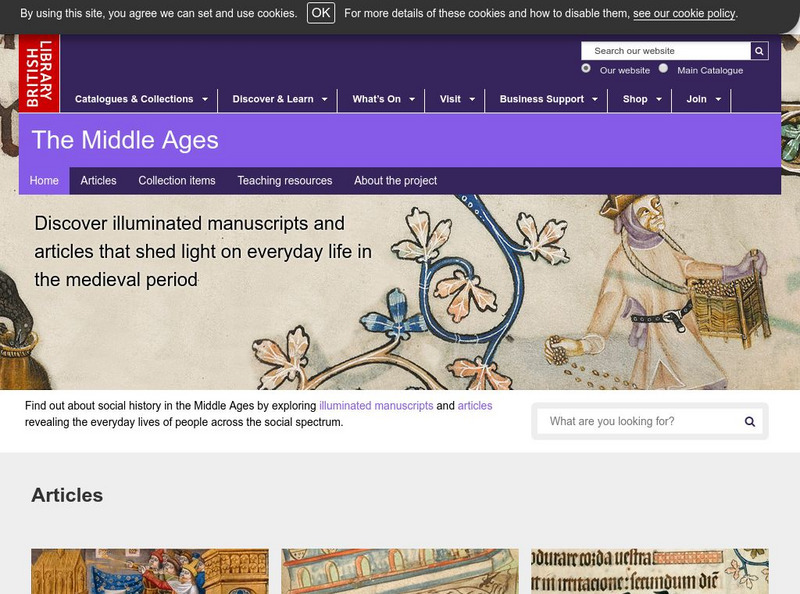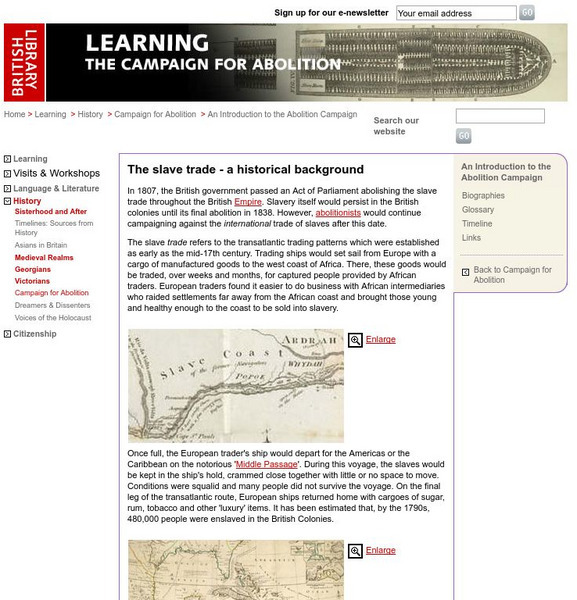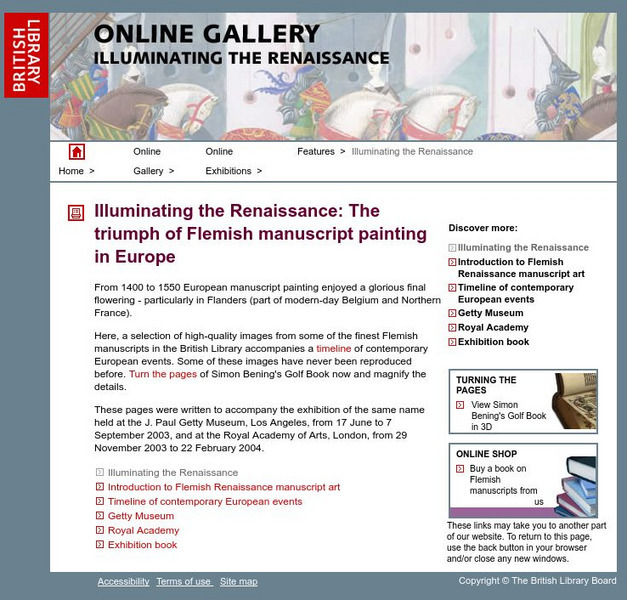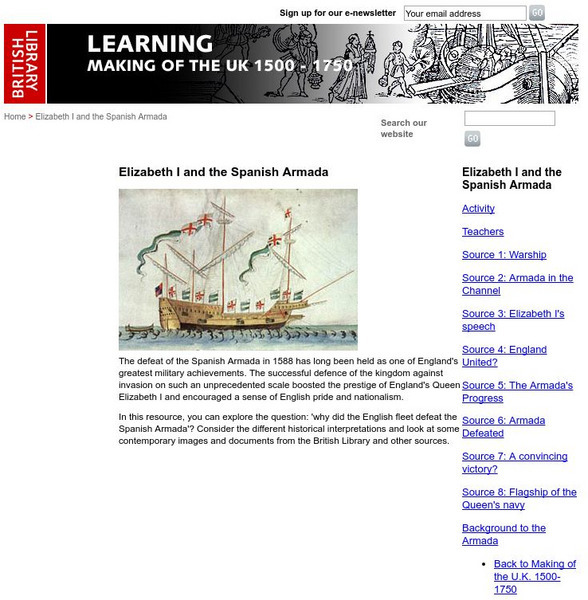British Library
British Library: Teaching Resources: The Tempest: Who Is Savage & Who Is Civilised?
These activities encourage students to explore the 'brave new world' of The Tempest in light of thought-provoking texts on early modern colonization. Included are discussion questions, primary sources, links for extended reading,...
British Library
British Library: Teaching Resources: The Tempest: Slideshow Who Is Savage & Who Is Civilised?
These activities encourage students to explore the 'brave new world' of The Tempest in light of thought-provoking texts on early modern colonization. A link to a slideshow featuring images of Native Americans and Europeans which...
British Library
British Library: Teaching Resources: The Tempest: Magic
This activity encourages students to explore Shakespeare's presentation of Prospero and his arts in the light of attitudes to magic in the Elizabethan and early Jacobean period. Included are discussion questions, primary sources, links...
British Library
British Library: Discovering Literature: Othello: Slideshow the Challenges of Staging the Play
These activities encourage young people to join the debate about how to stage and cast Othello. They will debate the pros and cons of different productions and plan how they would stage the play if they could do so themselves. Included...
British Library
British Library: Teaching Resources: Othello: The Challenges of Staging the Play
These activities encourage young people to join the debate about how to stage and cast Othello. They will debate the pros and cons of different productions and plan how they would stage the play if they could do so themselves. Included...
British Library
British Library: 20th Century: Fantasy and Fairy Tale
Find out how 20th-century writers used fantasy and traditional tales to analyze and question the real world around them.
British Library
British Library: 20th Century: Exploring Identity
Examine how writers have explored identity - through the prisms of ethnicity, class, gender, and sexuality - in the modern world.
British Library
British Library: 20th Century: Capturing and Creating the Modern
Discover the ways in which writers captured the fast-changing world around them during the 20th Century.
British Library
British Library: Discovering Literature: The Canterbury Tales: Reading Chaucer Across Time
Through a focus on digitized images of manuscripts and print editions of Chaucer's work, students will develop their understanding of how his poetry has been produced and read over the centuries.
British Library
British Library: Discovering Literature: Chaucer's 'The Merchant's Tale': Marriage & Relationships
'The Merchant's Tale' can be viewed as one of the 'marriage' tales in Chaucer's "The Canterbury Tales". Students can use this series of activities to explore how Chaucer portrays marriage, men and women, and relationships through the...
British Library
British Library: 20th Century: Art, Music and Popular Culture
Discover the music, art, and popular culture that shook the world in the 20th century.
British Library
British Library: 20th Century: 20th Century Theatre
Find close readings, critical interpretations, and personal responses to the works of key 20th-century playwrights and practitioners, including Samuel Beckett, Harold Pinter, Shelagh Delaney, and Timberlake Wertenbaker.
British Library
British Library: 20th Century: European Influence
Discover how European cities were crucibles for modernist experimentation.
British Library
British Library: Wordsworth's Lyrical Ballads: A Close Reading
"Lyrical Ballads" grew out of the friendship and artistic collaboration between William Wordsworth and Samuel Taylor Coleridge. In this lesson, students will explore a number of the poems in light of Wordsworth's key philosophies,...
British Library
British Library: Language & Literature: Dictionaries and Meanings
Article discusses the history of English dictionaries over a five-hundred-year period. Includes selections from Samuel Johnson's dictionary of 1755 and the Oxford English Dictionary. With useful comments about the origins of words,...
British Library
British Library: World War I: Europe Before 1914
Learn about the origins and reasons behind the outbreak of World War I. Globalization and military advancement are considered the major contributing factors leading to Europe's first major war since the fall of Napoleon.
British Library
British Library: Medieval Realms
A well-illustrated and colorful site about various aspects of the Middle Ages. Find sections on the death of Thomas Becket, A Book of Hours, Medieval Patterns, and Medieval Women.
British Library
British Library: The Slave Trade
An article describing the historical background to the Abolitionist movement in England, giving details on the slave trade and more.
British Library
British Library: Abolitionist Campaigners
A collection of short biographies of individuals who were involved in the anti-slave trade movement in England during the late 18th and 19th centuries.
British Library
British Library: Illuminating the Renaissance: Flemish Manuscripts
A selection of high-quality images from the Flemish manuscripts in the British Library along with a timeline of contemporary European events.
British Library
British Library: Trading Places (The East India Company)
Well-done site on the East India Company provides the following features: a timeline, the Company story, fact file, people in power, and Bombay, History of a City. An interactive virtual voyage game is also included.
British Library
British Library: Elizabeth I and the Spanish Armada
Through short frames with pictures and narrative, the story of the Armada unfolds. A good background to the battle is also provided. Click on the sources on the index to pull up each frame.
British Library
British Library: Oliver Cromwell: Images of Power
Take a look at four images of Cromwell. What can you learn from each image? Try this activity and then read his biography that is provided.
British Library
British Library: Expressions of Faith: Hindu Manuscripts
A collection of seven Hindu books from various time periods. There is a written commentary plus great illustrations. The author of the commentary is Ravi Shankar, the famous Sitar musician.




